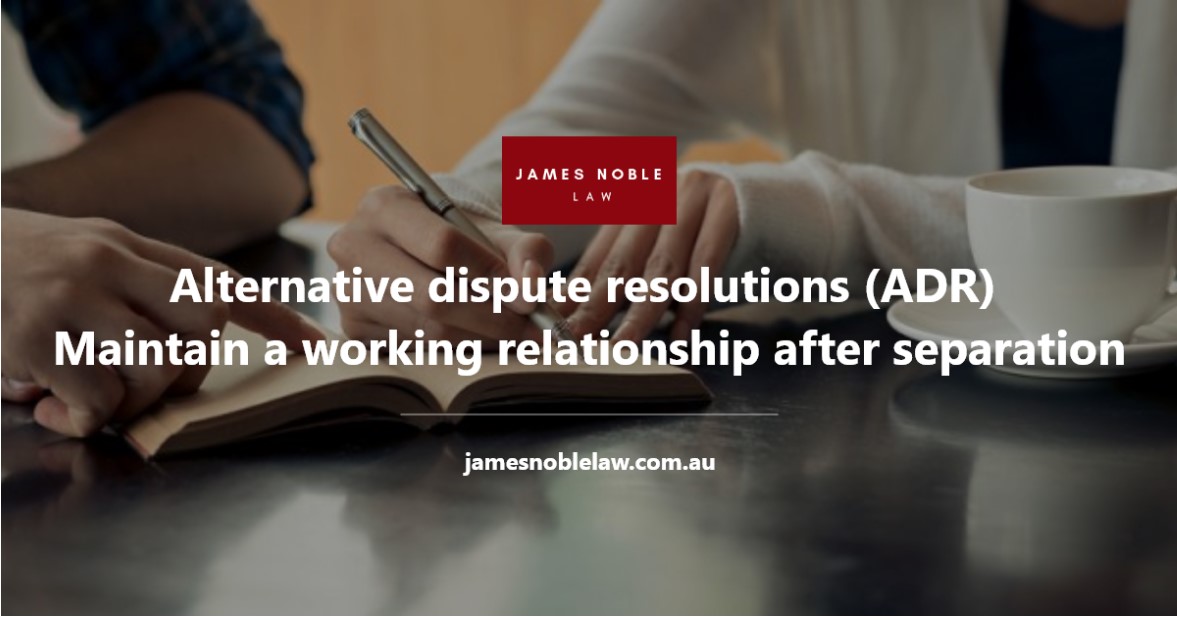Latest blog posts
Parenting Plan About Future Care Arrangements for your Children
Parenting Plan About Future Care Arrangements for your Children Are you and your former partner discussing the future care arrangements for your child or children? If so, perhaps consider entering into a Parenting Plan. It is a private agreement between two parents which can detail the agreed arrangements in relation to a child/children. This includes provisions for the time, school holidays, special occasions, telephone communication, etc. A Parenting Plan when signed by both parties then comes into effect. And it...
Read More
Considering Applying for a Divorce in Australia?
Are you considering applying for a Divorce in Australia? If you and your Husband or Wife have been separated for more than 12 months, then you can apply for a divorce in Australia to end the marriage. If for any period of the 12 months of separation you and your former partner were living together separated under the one roof, then you will need to file an affidavit explaining the circumstances to the Court and confirming that you and your...
Read More
Overflow Causes The Family Court and Federal Circuit Court to Merge
Overflow Causes The Family Court and Federal Circuit Court to Merge Many know that the family law courts are overflowing with matters and many of those matters relate to family violence and abuse, neglect, or harm coming to children. Some may not know that the majority of all family law matters that go to Court start off in the Federal Circuit Court. This Court (originally named The Federal Magistrates Court) was formed in 1999 to deal with less complex cases...
Read More
Notice of Child Abuse, Family Violence, or Risk in Parenting Proceedings
Notice of Child Abuse, Family Violence, or risk in Parenting Proceedings If you commence or respond to parenting proceedings, you will be required to file a Notice of Child Abuse, Family Violence, or risk, an Application or Response will not be accepted for filing without the notice. This document alerts the Court to possible risks to the child or children or even the parties themselves involved in the litigation. The most prevalent risks are often categorised as neglect, emotional abuse,...
Read More
Mental Health and Family Law
Mental Health and Family Law Separation is one of the most significant life events a person can experience. Worry, anxiety, and stress over the uncertainty surrounding the arrangements for the children, money, and a property settlement division can be extremely difficult to cope with under challenging circumstances. It’s therefore important that you prioritize your mental health and wellbeing during this time. Talk to your friends or family members for support. Take extended leave from work. Or consider seeing your GP...
Read More
What Are You Worth in Your Property Settlement?
What Are You Worth in Your Property Settlement? That is (sometimes) the million-dollar question. In determining what a client is worth in a property settlement, we (and the Court) utilise a 4 step process. The 1st step is to determine the value of the net asset pool that is available for division between the parties. This includes adding up the value of all the assets (whether in one party’s name or joint names), taking away all the liabilities and then...
Read More
What’s The Lighthouse Project effect in Brisbane, Australia 2021?
About The Lighthouse Project effect in Brisbane The Lighthouse Project came into effect in the Brisbane Registry of the Family and Federal Circuit Court of Australia in early 2021. It is a pilot program designed to assist the most vulnerable participants in parenting matters with concerns as to family violence, abuse or neglect, substance issues, and other safety issues. Why The Lighthouse Project? The main aim of The Lighthouse Project is to identify risk and provide parties with additional support...
Read More
How Australian Lawyers getting hurt as a result of COVID-19 shutdowns
How Australian Lawyers are getting hurt? Australian Lawyers getting hurt as a result of Covid-19 shutdowns. Digital Disruption leading them back to work. Like most other industries, the legal fraternity is seeing difficulties with the continuing lockdowns in many states and area hotspots. The legal profession can be proud of the way it has adapted to servicing clients and continuing to work from remote locations however some layers have seen their firms suffer financially as a result. Lawyers are using...
Read More
5 Best Suggestions for co-parenting during COVID-19 in Australia
Best 5 Suggestions for co-parenting Australia during COVID-19 Today we brought five suggestions for you on "co-parenting Australia". The Australian Government restrictions are frequently changing to ensure the safety of the people and this means there has been more people in self-isolation and the norm of daily living has changed. Parents are working from home and schooling their children at home also, to a large degree, has moved online which can be stressful for many families. For parents who are...
Read More
How Australia Introduced ‘No Fault Divorce’ – And Why Our Family Law System is Under Review Again
No-Fault Divorce in Australia For decades, if you wanted a divorce in Australia, you had to prove your spouse was to blame. No-fault divorce was not legal by local law. The grounds ranged from habitual drunkenness to adultery, and many cases involved the use of private investigators. Some couples who privately agreed to separate would even have to stage adulterous trysts for later evidential use in court. This all changed in 1975 with the introduction of "no-fault divorce" and the Family...
Read More
Parental Responsibilities and Children’s Issues
You have had counselling with your partner and possibly your own counselling to solve Parental Responsibilities. Matters cannot be resolved. You have received financial advice to know what your financial future holds. You have endeavoured in every way possible to negotiate with your partner but without success. The stumbling block seems to be who is to care for your children. However, you may have been successful in taking Parental Responsibilities. If you have been able to work out a parenting...
Read More
Alternative dispute resolution (ADR) to Maintain a working relationship with your former partner after separation
How to avoid court? Alternative dispute resolution. Maintain a working relationship with your former partner after separation, especially if there are children For the sake of your family, especially your children, after a separation, it is important, if at all possible to do so, to maintain a working relationship with your former partner alternative dispute resolution. If only for a short period of time to help negotiate a resolution of financial and children’s issues. Seek a resolution of such issues...
Read More
How Australian Family Law Act Determines Your Entitlements to Property?
Australian family law act determines your entitlements to property James Noble is a familiar face and expert family lawyers in Brisbane have suggested some way to get your Property by the Australian Family Law Act. If you are searching for legitimate advice before divide family property. This article can be a cool source to help you make the thing happen legally and by the Australian Family Law Act. The four-step approach of the Family Law Act which was adopted by...
Read More
What is a Collaborative Practice Agreement?
What is a Collaborative Practice Agreement? In a Collaborative Practice agreement, the desires of the parties participating in the negotiations are ascertained prior to the first combined meeting with their lawyers and with each other at the time of the early stages of the joint negotiation meetings. It is quite common for parties to have the same wishes and goals, which are usually recorded on a whiteboard and which are visible throughout the negotiating process. James Noble Law is an...
Read More
Are You Considering Marriage Separation Process in Australia?
Marriage Separation Process in Australia (Marriage, Families and Separation Brochure, Certificate) Marriage Separation Process in Australia or in your family. What does it mean for you? Have you clearly thought it through? This could be one of the most traumatic experiences a family will face. Family Separation can be devastating for everyone involved. How well you handle a separation will impact on how well you and your family cope now and in the future. Are the traumas and conflicts that...
Read More
Superannuation Legislation: Protecting your financial interests under Family Law
They are property issues and superannuation. Superannuation Legislation for many years was not property under the Family Law legislation and the Court had no power to deal with it although the Court, to overcome this difficulty, made an adjustment to a party’s interests and in some cases extreme adjustments to compensate a party for the loss in the other party’s superannuation. The classic examples for high adjustments related to people in professions or employment where there were large superannuation interests...
Read More
Family law rules disclosure – You Must Know Full And Frank Disclosure
Family law rules disclosure - You must need to know You must know the Family law rules disclosure In Family Law property or parenting proceedings, the parties have a responsibility to provide full and frank disclosure. The duty of disclosure family law is a requirement for all parties involved in a family law dispute to provide to each other party all information relevant to an issue in the case. Family law rules disclosure - in property matters In addition to...
Read More
Working Remotely for the best Law Firm Australia | James Noble Law
Working Remotely with The Best Law Firm Australia, ain't no joke! To successfully start working remotely for the best law firm in Australia, it is imperative that you have excellent Workplace Communication in place. Communication is especially important in the workplace; this is what drives increased productivity, improves morale and efficiency. It helps foster an excellent working relationship between you, your boss, and your colleagues. Therefore, at James Noble Law we start the day with a Microsoft Teams meeting and...
Read More
Five Simple Ways To Cut Unnecessary Costs On Your Family Lawyer
As with many professional services sectors, law professionals generally really only sell their time. And, as we all know very well, time is money. So if you are searching for legal advice the family lawyer cost can be higher depending on the expertise level of your attorney. In the interest of saving everyone time (and money), we've compiled a shortlist of items to consider if budget is a factor (and let's face it that it probably is!). Keep these in...
Read More
How To create a Airtight Binding Financial Agreements ? How Tight Is An Airtight BFA?
Preparing an Airtight Binding Financial Agreements Binding Financial Agreements (BFA), also referred to as “pre-nups” are created when two parties have made a fully informed decision to enter into a binding agreement. The creation of an Airtight Binding Financial Agreements requires the parties to disclose their financial position, provide reasonable time to consider the agreement and obtain independent legal representation to avoid any undue influence or pressure on the other party. This document effectively allocates assets and other financial resources...
Read More






















